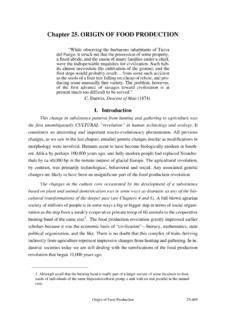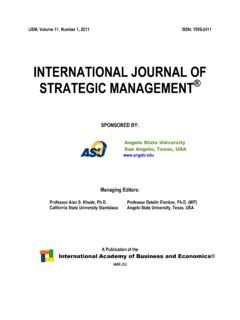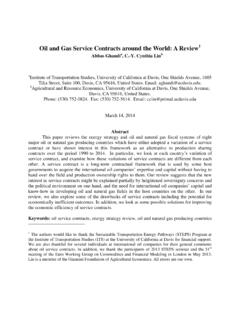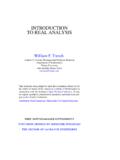Transcription of Part I. Introduction Chapter 1. What is Human Ecology?
1 What Is Human Ecology? 1 Part I. IntroductionChapter 1. What is Human Ecology? Chapter 2. Environment, Technology, and Culture2 What Is Human Ecology? Chapter 1. WHAT IS Human Ecology? Another Unique Species(Title of Robert Foley s 1987 book on evolutionary Human ecology)I. IntroductionWhat is Human Ecology? Human ecology is an approach to the study of Human be-havior marked by two committments. First, Human ecologists think that humans should bestudied livingsystems operating in complex Human sciences are bal-kanized into several social science, humanistic, and Human biological disciplines. Ecolo-gists are used to thinking that systemic nature of individual organisms and populations oforganisms mean that we typically have to understand how diverse parts of the system op-erate together to produce behavior. The traditional Human science disciplines take peopleapart; Human ecologists endeavor to put us back together.
2 Breaking complex problemsdown to operationally tractable parts is a great strategy, but only so long as some are co-mitted to puting them back together in the end! Second, Human ecologists think that hu-mans are subject to very similar ecological and evolutionary processes as any other course, humans are unique, and this fact has important consequences. However, wethink that the deep rifts between Human biologists and social scientists (and between scien-tists and humanists for that matter) are a deeply embarassing scandal that honest scholarsare obligated to repair as expeditiously as study Human Ecology? As Dr. Vila puts it: I regard the study of Human ecologyas much more than an enjoyable intellectual challenge. I ve spent the majority of my adultlife dealing with Human aggression and violence: as a young Marine in Viet Nam; as a streetcop in Los Angeles; as a police chief in the emerging island nations of Micronesia; and asone of the people responsible for planning for the continuity of our national government inthe event of a nuclear war.
3 These experiences have led me to believe that it is imperativethat we gain a fundamental understanding of why humans sometimes cooperate and behavealtruistically and why they sometimes act in the opposite fashion. The lack of good, well-verified answers to the big questions in Human ecology, andin the Human sciences more generally, is a bit scary. Our high level of ignorance of the caus-es of Human behavior is not reassuring. Several of the ideas we will introduce are positivelychilling. For example, we will discuss the idea that arms races and the dangerous game ofwar are virtually a natural phenomenon and thus extremely difficult to control. We will alsodiscuss evidence that there is no guarantee that Human collectivities can act according toWhat Is Human Ecology? 3simple norms of rationality, and how absurd cultural norms can arise through simple sys-tematic processes involving positive feedback ( , vicious cycles).
4 Sleepless nights can re-sult from the realization that we share the planet with a large, dangerous, unpredictableanimal each other. Writing some lectures in this course sometimes feels a bit like writingthe script for a horror movie, except that it really happens! Perhaps the most important prac-tical message of this course is this:Of course, people are often beautiful, charming and certainly always interesting. Forscientists, there is the challenge of the unknown. If people were well understood they d alsobe boring. Let us not overdo the misanthropy!Welcome to the frontier! Human ecology is an area of science where the frontierproblems of the discipline can be presented to an upper division class. We ll try to exposeyou to this frontier as the quarter progresses. You will see that we have more interestinghypotheses than firm answers, and no little amount of plain hope that you will enjoy this aspect of the course.
5 The frontier is where therealproblems are at for a practicing scientist. Most of them learn to enjoy operating on the edgeof the known, trying to convert ignorance and confusion into tolerably reliable the scientific frontier to reduce chaos, error, and confusion to orderlyknowledge is apt to be confusing, boring, and hard work like life on a real frontier. Sci-entists suffer all this for the occasional thrill that comes from discovering an important bitof new knowledge for oneself. Most science is a poor spectator sport; you need a couple ofyears of post-graduate education just to work your way up to the frontier. Human ecology,because it deals with relatively neglected problems, has a more approachable frontier. Wehope you ll enjoy like on the frontierTHE PRACTICAL MESSAGE:We do not yet know enough about humans toreliably control our more dangerous and de-structive behaviors.
6 Until we do, the humanadventure is liable to be often a little more ex-citing than one would like. No need to panicright here right now, but, as you know from thenewspaper things can get hairy!4 What Is Human Ecology? II. Basic Concepts of Human EcologyA. Basic DefinitionHuman ecology is the study of the interactions of humans with their environments,or the study of the distribution and abundance of humans. This definition is based directlyon conventional definitions of biological ecology. Ecology is usually defined as the studyof interactions of organisms with their environments1and each other. More pointedly, itcan be defined as the study of the distribution and abundance of organisms. This definitionis deceptive. It implies much more than it says explicitly because virtually everything thathumans are or do (and the same goes for any species) affects their distribution and abun-dance.
7 Thus, using theterm Human ecology actually expresses a broad ambition to un-derstand Human Borrowing Concepts from BiologyThe basic rationale for Human ecology is that concepts and methods shared with thebiological sciences ought to be useful to understand Human behavior. Our behavior is takento be just a special case of general ecological processes (as any particular species is a spe-cial case). This idea has a long history in demography, for example. Malthus pioneeringideas about Human population explosions played a large role in Darwin s thinking about allpopulations. Darwin s ideas about natural selection in turn have had a large influence onhow we think about humans. As Foley s title in the epigraph indicates, humans may be apeculiar beast, but then so is every other species. We agree with Foley that humans can tstand in some splendid isolation from the rest of the next lecture we introduce the classic culture core model of how we re nec-essarily connected to the ,peoplehavetomakealivingbyextract-ing resources from the environment.
8 So do all organisms. Typical organisms use organicstructures directly to moke a living; lions kill prey with their teeth and monkeys grind hardseeds with their teeth. People do a little of the same, but most of our adaptations revolvearound complex traditional skills we have learned from others. Human populations have agiven basic set of tools (technology), whatever their evolving cultural tradition has devel-oped to that point. The details of the toolkit will vary adaptively in the context of the giventype. For example, hunting societies that live in environments rich in aquatic resources will1. Environment is defined as the circumstances, objects, or conditions by which one is usually include the complex of physical, chemical, and biotic factors ( , climate, soil, andliving things) that act upon an organism or an ecological community and ultimately determine itsform and survival.
9 When discussing humans, environment often includes the aggregate of socialand cultural conditions that influence the life of an individual or community. The definition leavesit up to the analyst what to put inside the population and what outside in the environment. Alwayswatch this move closely!What Is Human Ecology? 5use harpoons, whereas desert dwellers will lack such devices. Our technological traditionsare so variable from place to place and time to time that ecologically we function as if wewere many different species. The application of a given technology in a given environmentwill strongly influence (or at least strongly constrain) the density of people that can be sup-ported and the effort that must be devoted to subsistence. Population density (and the pos-sibilities for aggregation into large settlements versus the need to stay dispersed to exploitextensive resources) will determine (strongly constrain) social organization.
10 Complex so-cial interactions require many people, which is impossible in a dispersed, low density soci-ety. The extreme specialists ( college professors and students) require that foodproduction be efficient per producer, so that a few producers can support us parasites [ev-er hear a farmer grumble about city-dwelling parasites? If not, we ll bet you don t knowmany farmers.]. At the same time, societies must mobilize the same basic technology in dif-ferent ways, depending upon the resources the environment offers. At least environment,technology, demography, and social and political organization ought tohighly systemicwith the primary causal arrows leading from environment and technology to demographyto social and political organization. Perhaps even some symbolic features of culture like re-ligion may have some systematic relationship to ecology (see Figure 1-1) As we ll see inmore detail in Lecture 2, technology, social institutions (the cultural rules that organize so-ciety and politics) and any other elements of culture that impact technology and demogra-phy, are important parts of the Human ecological system.










